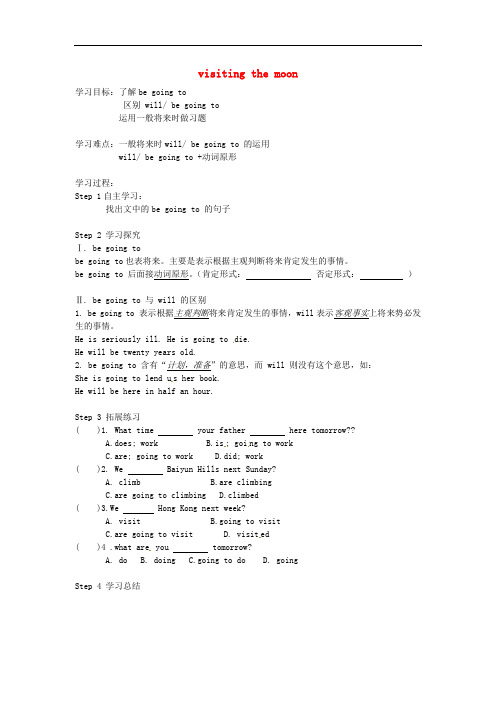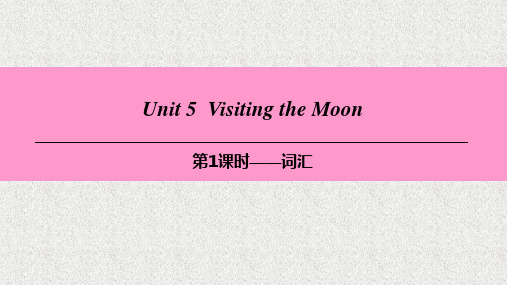新沪教版初中英语七年级上册Module 3 Travels unit5 Visiting the moon 知识点归纳及单元语法.doc
- 格式:doc
- 大小:530.21 KB
- 文档页数:25


visiting the moon学习目标:了解be going to区别 will/ be going to运用一般将来时做习题学习难点:一般将来时will/ be going to 的运用will/ be going to +动词原形学习过程:Step 1自主学习:找出文中的be going to 的句子Step 2 学习探究Ⅰ. be going tobe going to也表将来。
主要是表示根据主观判断将来肯定发生的事情。
be going to 后面接动词原形。
(肯定形式:否定形式:)Ⅱ. be going to 与 will 的区别1. be going to 表示根据主观判断将来肯定发生的事情,will表示客观事实上将来势必发生的事情。
He is seriously ill. He is going to die.He will be twenty years old.2. be going to 含有“计划,准备”的意思,而 will 则没有这个意思,如:She is going to lend u s her book.He will be here in half an hour.Step 3 拓展练习( )1. What time your father here tomorrow??A.does; workB.is; goi ng to workC.are; going to workD.did; work( )2. We Baiyun Hills next Sunday?A. climbB.are climbingC.are going to climbingD.climbed( )3.We Hong Kong next week?A. visitB.going to visitC.are going to visitD. visit ed( )4 .what are you tomorrow?A. doB. doingC.going to doD. goingStep 4 学习总结。


【重点内容】沪教版七年级英语上册Unit 5 Unit5单词diary n. ['daɪəri] 日记space n. [speɪs] 空间spaceship n. ['speɪsʃɪp] 飞船spacesuitn.['speɪssuːt;-sjuː宇航服nervous adj. ['nɜːvəs] 紧张的leave v. [liːv] 离开gravity n. ['grævɪtɪ] 重力able adj ['eɪb(ə)l] 有能力的float v. [fləʊt] 漂浮tie v. [taɪ] 领带、捆ourselves pron [aʊə'selvz] 我们自己without prep. [wɪð'aʊt] 没有weak adj. [wiːk] 弱的breathe v. [briːð] 呼吸if conj. [ɪf] 如果camera n. ['kæm(ə)rə] 相机work n. [wɜːk] 工作garden n. ['gɑːd(ə)n] 花园rock n. [rɒk] 岩石postcard n. ['pəʊs(t)kɑːd] 明信片machine n. [mə'ʃiːn] 机器return v. [rɪ'tɜːn] 返回more than 多于(be) able to 能够have to 不得不;必须so that 以便take photos 拍照as … as像……一样;如同that is 也就是说;即such as 例如Unit5课文Reading A trip to space 一次太空旅行by Jerry杰瑞著10 October 20532053年10月10日I'm so happy!我很开心!Tomorrow I'll be one of the first students to travel into space.明天我将成为第一位进入太空旅行的学生。


2024年新沪教牛津版初一上册Unit 5重点短语和知识一.重点短语In space在太空Over the years这些年来Space station太空站Travel into space去太空旅行Take sb. to带某人去...Can’t wait to do sth.迫不及待地做某事Tie...to...把...栓在...上So that因此Float away飘走Have to do sth.不得不做某事Be going to将要Take photos拍照Departure time出发时间Find out查明Be away离开Ask sb. to do sth.叫某人做某事Ask sb. not to do sth.叫某人不要做某事Ask sb. for help向某人寻求帮助Go on a trip去旅行Do some experiments做一些实验Dream trip梦想之旅One day有一天Get into进入Look out of看向...的外面Focus on专注于Be curious about对...好奇Land on the surface降落在表面At the beginning of在...的开始Do some research on在...做一些研究二.重点句型1.What can astronauts do on the Moon?宇航员们能在月球上做什么?2.They can walk on the Moon.他们能在月球上行走。
3.It takes me half an hour to finish my homework.完成家庭作业花费了我半个小时。
4.Would you like to travel on the Moon?你想要去月球旅行吗?5.How will you prepare for a trip to space?你会如何准备去太空的旅行?6.There is much less gravity, so we have to tie our sleeping bags to the wall when we sleep.那里的重力要小得多,所以我们在睡觉时,不得不把睡袋绑在墙上。
Unit 5 Visiting the Moon一.必背单词1.diary 日记,日记簿2. space太空3. spaceship宇宙飞船4.spacesuit宇航服,航天服 5. nervous紧张的 6. leave 离开7.able 能够8. tie糸,捆,绑9.ourselves 我们自己10. without没有11. weak虚弱的,无力的12. breathe 呼吸13. if如果14. camera照相机15. work运转;运行16. garden花园17. rock 岩石18.postcard明信片19.machine机器20. return返回21. gravity重力,地球引力22. float漂浮;浮动二.必背短语1.more than 多于2. be able to能够3.have to 不得不,必须4.so that 以便5. take photos 拍照6. as…as…像。
一样;如同7. that is 也就是说8. get weak变虚弱9. tie…to…把。
糸在。
上10. be excited about 对。
感到兴奋11. bring back 带回12. such as例如13. take…to…带。
去。
14.one of the first students第一批学生之一15. on the Moon在月球上16. in the future将来17. get excited 变得兴奋,激动18. come back 回来19.a large amount of 大量20. be interested in对。
感兴趣21. do exercises 做运动22. visit the Space Museum 参观太空博物馆23. at the moment目前24. at the school gate在学校门口25. in the swimming pool在游泳池里三.同义词1. leave= go away from 离开2. return=come back/go back 返回3. have to =must必须4. be able to=can 能够5. tie=hold two or more things together with a rope糸,捆,绑6. breathe=take air into and send it out of your body呼吸7. at the moment =now目前8. more than =over超过9. so that=in order that 以便10.worry about sb.=be worried about sb.担心某人四.重点句型1.。
visitin g the moon学习目标:高频词汇短语的运用一般将来时的运用will与 be going to 的区别运用学习过程Step 1 单词拼写1.We are going to travel to the Moon in the s .2.We will a in the moon after four days’ travel.3.I am so n because everything is new for me in the space.4.Wearing a spacesuit can help us b on the moon.5.If my c still works up there, I will take a lot of photos.Step 2 词组填空1.We will go to the park and (拍照) there.2.(多于)thirty students in our class will take part in the game.3.After supper, I (不得不)wash dishes every day.Step 3 完成句子1.他擅长几种外语,例如英语、法语、日语。
He several foreign languages, English, French, Japanese.2.他日夜工作,这样才能赚钱养家。
He worked day and night he could make enough money for the family.3.有的恐龙有十头大象那么大。
Some dinosaurs ten ele phants.Step 4 语法选择1. They are going to a picnic in the park.A.doB.makeC.haveD.has2. you books form the library tomorrow?A. Will; borrowB. Do; borrowC. Will; borrowsD. Do;borrows3. Ne xt week David the zoo in Panyu.A. will visitB. visitC. visitsD. visitedStep 4 学习总结。
七上Module3 TravelsUnit5 Visiting the Moon Unit6 Travelling around Asia中考总复习中考必考词汇、句型讲解Part I 基础知识课前自测一.根据中文写单词1. 太空(n)________2. 紧张的(adj.)________3. 离开(v)________4. 呼吸(v) ________5. 日记(n)________6. 返回(v)________7. 能;能够(adj.)________ 8. 系、捆、绑(v)________9. 我们自己(pron.)________ 10. 没有;缺乏(prep.)________ 11. 亚洲(n.)________ 12. 传统的(adj.) ________13. 照亮;使明亮(v)________ 14.现代的;近代的(adj.) ________ 15.观光;游览(n) ________ 16. 饺子;汤圆(n) ________二.根据中文写短语1. 不得不;必须________2. 拍照________3.能够________4. 多于________5. 以便________6.也就是说;即________7. 例如________ 8. 其中之一________9. 像……一样;如同________ 10. 帮助某人呼吸________11. 喜欢观光________ 12. 在……中心________13. 最大的城市之一________ 14.沿着……走________15. 照亮天空________ 16. 从四面八方________17. 自然美________ 18. 不同的小吃________19. 现代化的建筑________ 20. 大型公共区域________三根据句子意思,用所给单词的适当形式填空1.It will take me a long time _________ (find) out the truth of life.2.Tom is __________ (go) to Shanghai next Monday.3.Lily and Lucy will take the English exam next week and now they are very______(worry).4.It’s almost 11 : 00 p. m. We are going ____________(leave) now.5.My father always has something _______ (excite)o tell my mother and me.6.Jimmy wrote more than fifty _______ (diary) when he was in America alone.7.Thank you so much, Mr. Li. _______ (with) your help , I won't get A in the exam.8.Wi11 Taylor Swift be one of the _________(one) singers to get the prize ?9.Now my father is _______ (tie) the cow to a tree.10.We all enjoyed ________ (our) at the party 1ast night.11.The government wanted to have more_________ (bui1d)for the poor to 1ive in .12.Beijing is One of the __________ (large) cities in our country.13.We Can enjoy natura1 __________ (beautiful) in Yu Garden.14.Marry enjoys eating __________ (dump1ing) during the Spring Festiva1.15.I turned off a11 the _______ (light) so that I could fall asleep.16.Maria is from India, an _________ (Asia) country.17.My father likes watching TV, whi1e my mother 1oves going _________( sightsee).18.At 1ast, the________(beauty) girl ca11ed Cinderella married a prince and 1ived a happy 1ife.19.In China, We usua1ly have different _________(tradition) customs during different festival.20.If you wa1k a1ong the river, you wi11 be able _________ (see) many fish in the river.四、回归课文语法填空。
Unit 5 Visiting the Moon一.必背单词1.diary 日记,日记簿2. space太空3. spaceship宇宙飞船4.spacesuit宇航服,航天服 5. nervous紧张的 6. leave 离开7.able 能够8. tie糸,捆,绑9.ourselves 我们自己10. without没有11. weak虚弱的,无力的12. breathe 呼吸13. if如果14. camera照相机15. work运转;运行16. garden花园17. rock 岩石18.postcard明信片19.machine机器20. return返回21. gravity重力,地球引力22. float漂浮;浮动二.必背短语1.more than 多于2. be able to能够3.have to 不得不,必须4.so that 以便5. take photos 拍照6. as…as…像。
一样;如同7. that is 也就是说8. get weak变虚弱9. tie…to…把。
糸在。
上10. be excited about 对。
感到兴奋11. bring back 带回12. such as例如13. take…to…带。
去。
14.one of the first students第一批学生之一15. on the Moon在月球上16. in the future将来17. get excited 变得兴奋,激动18. come back 回来19.a large amount of 大量20. be interested in对。
感兴趣21. do exercises 做运动22. visit the Space Museum 参观太空博物馆23. at the moment目前24. at the school gate在学校门口25. in the swimming pool在游泳池里三.同义词1. leave= go away from 离开2. return=come back/go back 返回3. have to =must必须4. be able to=can 能够5. tie=hold two or more things together with a rope糸,捆,绑6. breathe=take air into and send it out of your body呼吸7. at the moment =now目前8. more than =over超过9. so that=in order that 以便10.worry about sb.=be worried about sb.担心某人四.重点句型1.。
so that…以便;为了(引导目的状语从句)(1) We will have to tie ourselves to our beds so that we won’t float away in our sleep! 我们将不得不把自己绑在床上,以便我们睡觉时不会飘走。
(2)He always gets up very early so that he can catch the first bus.为了能赶上第一班车,他总是很早起床。
2.as…as sb. can 尽可能。
(1)I’m going to take many photos as I can, that is, if my camera still works up there.也就是说,如果我的照相机在太空中还能用的话。
我将尽可能多拍些照片。
(2)We should do as many things as we to protect the Earth.我们应该尽量多做一些事情来保护地球。
3.be able to do sth. 能够做某事(1)There is no gravity in space, so we’ll all be able to float around in the spaceship.太空里没有地球引力,所以我们都将能够漂浮在宇宙飞船里。
(2)I’m able to carry the box by myself.我能够自己搬这个箱子。
4.It takes/took/will take sb. +some time +to do sth.(1)The Moon is around 380,000 kilometres from the Earth, so it’ll take us about fourdays to get there.月球距离地球380,000公里,所以我们将花四天的时间才能到那里。
(2)It usually takes me two hours to do my homework every day.我通常每天花2个小时做作业。
(3)It took Tom one hours to clean his room yesterday.汤姆昨天花了1个小时清洁他的房间。
五.语法:一般将来时的用法一般将来时表示将来某个时间将要发生的动作或存在的状态,或表示将来经常或反复发生的动作。
常与tomorrow,next year,this Saturday, soon, in the future, in a moment等表示将来的时间状语连用。
(一)、含助动词will的一般将来时例如:1. He will have an important meeting tomorrow morning.2. I won't go swimming with you this afternoon.3. --- Will Lucy come to the party tomorrow?--- Yes, she will./No, she won’t总结: 通过以上例句我们可以看出,含助动词will的一般将来时的结构如下:肯定句:主语+ will + do+其他否定句: 主语+ will + not + do+其他(will not可缩写为won't)一般疑问句: Will+主语+do+其他肯定回答: Yes,主语+will;否定回答:No,主语+ won't(二)、be going to表示一般将来时例如:1. He is going to visit his grandfather next weekend.2. We aren’t going to fly to Beijing tomorrow because of the bad weather.3. --- Are you going to have a picnic this Sunday?--- Yes, we are./No, we aren't.总结:通过以上例句我们可以看出,be going to表示一般将来时的结构如下:肯定句:主语+am/is/are + going to+ do+其他否定句:主语+am/is/are not + going to +do+其他一般疑问句:Am/Is/Are+主语+going to+ do+其他肯定回答:Yes,主语+am/is/are;否定回答:No,主语+am/is/are + not(三)注意when 引导的时间状语从句或if引导的条件状语从句中用一般现在时代替将来时,简称“主将从现”(四) there be句型的将来时形式There will be …There is gong to be…Unit 5 Writing【写作目标】假设你是班长,准备组织班上同学这个周六到动物园玩。
请你根据下表的提示,向同学们说明这次活动的安排,80词左右。
开头和结尾已给出,不计入总◆审题:(一)本文是要求写一篇外出活动安排,所以要注意讲清楚时间、地点以及安排。
(二)时态:以一般将来时为主。
(三)书写正文。
把表格中所给的内容提示组句成文,切不可遗漏要点,可适当发挥。
虽然是介绍一天的安排,但也要避免写成流水账,令读者读起来枯燥乏味。
这样,就需要我们运用一些句式和注意句与句的衔接。
(四)检查校对全文。
特别注意提示中的要点是否齐全。
◆联想:写作本篇作文可能需要的短语和句型短语: meet at the school gate; arrive at; look at; watch; play games; go home句式:…,because....After we do…,w e do…Before we do…,we do…◆组句成文This Saturday, we are going to visit the zoo. ________________________________________________________________________________________________________ _____________________________________________________________________ Hope we will have a good time!参考范文:This Saturday, we are going to visit the zoo. We are going to meet at the school gate at 8:00, and take a bus together. After an hour's journey, we will arrive at the zoo. Then, we will have two and a half hours to visit the zoo. We can look at the animals, watch the shows and play games. At 11:30, we will get together again to eat the food we bring. We will meet at the gate of the zoo at 14:00 and take a bus again to go back to school. Then we'll go home.Hope we will have a good time!【一展身手】假如你叫王清,你的英国笔友Jack来广州玩,你将带他参观广州塔,请你按以下要点给他写封回信,告诉他你的安排。
安排:1.傍晚5点出发,大约6:00上塔;2.在塔上游玩、拍照;3. 7:30下来,在塔下继续拍照留念;4. 大约9:00回到宾馆。